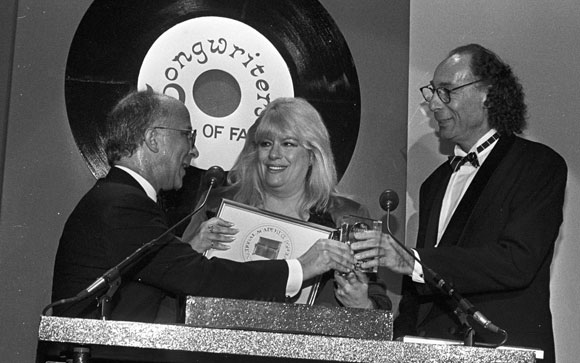The world of songwriting suffered a major loss on August 25, 2009 with the passing of Ellie Greenwich. Greenwich, together with Jeff Barry (her former co-writer and ex-husband), was inducted into the Songwriters Hall of Fame in 1991. The Barry-Greenwich team was among the most successful and prolific of the Brill Building songwriters of the 1960s era.

Paul Shaffer presenting to Ellie and Jeff Barry in 1991. Photo Courtesy Songwriters Hall of Fame, Sam Teicher Archive
Greenwich, who was “discovered” in 1962 by fellow SongHall Inductees Jerry Leiber & Mike Stoller, had already begun to make an impact, having written songs with such collaborators as Ben Raleigh and Mark Barkan. She was also a notable session singer, recording so many demos that she became known as New York’s Demo Queen. She wrote songs with Doc Pomus and Tony Powers and enjoyed her first chart successes with “This Is It,” by Jay and the Americans, and “He’s Got the Power,” by the Exciters. Phil Spector, who had been introduced to Greenwich by publisher Aaron Schroeder, produced her hits “(Today I Met) The Boy I’m Gonna Marry” (Darlene Love), and “Why Do Lovers Break Each Others’ Hearts?” (Bob B. Soxx & the Blue Jeans, with Love on lead vocal).
In October 1962, Barry and Greenwich married, and shortly afterwards decided to write songs exclusively with each other — a disappointment for Tony Powers as well as Barry’s main writing partner, Artie Resnick. Barry was subsequently signed to Trio Music (Leiber and Stoller’s publishing company), and he and Greenwich were given their own office in the venerable Brill Building. Before the end of 1963, Barry-Greenwich had scored hits with songs such as “Be My Baby” and “Baby, I Love You” (The Ronettes), “Then He Kissed Me” and “Da Doo Ron Ron” (The Crystals), “Not Too Young To Get Married” (Bob B. Soxx & the Blue Jeans), and “Christmas (Baby Please Come Home)” (Darlene Love), all co-written and produced by Phil Spector. Greenwich and Barry also recorded singles and an album under the name The Raindrops, with Greenwich providing all the female vocals through overdubbing, and Barry singing backgrounds.
In addition to “What A Guy” (actually a demo, with Greenwich on piano and Barry on drums, sold to Jubilee Records and released as the first Raindrops single) and the U.S. Top Twenty hit “The Kind Of Boy You Can’t Forget,” the couple wrote and recorded “Hanky Panky,” which became a major 1966 hit for Tommy James & the Shondells, and, the following year, “Do Wah Diddy Diddy,” taken to #1 by Manfred Mann. Toward the end of 1963, the Raindrops recorded “That Boy John,” a tuneful and catchy fusion of jazz and rhythm & blues, which stalled in the middle of the charts because, according to Barry and Greenwich, the recent assassination of President John F. Kennedy made radio stations reluctant to play the song. Barry and Greenwich also penned songs for Connie Francis and Lesley Gore.
Red Bird Records was founded in 1964 by Leiber & Stoller, who brought Barry and Greenwich in as songwriters and producers. The label’s first release was The Dixie Cups’ “Chapel of Love” (written with Phil Spector and originally recorded by The Ronettes), which sailed up the U.S. charts to #1. Barry and Greenwich wrote and/or produced a number of hits for Red Bird including other releases by The Dixie Cups, as well as The Ad-Libs (“He Ain’t No Angel”), The Jelly Beans (“I Wanna Love Him So Bad”), and The Shangri-Las (“Leader of the Pack,” co-written by George “Shadow” Morton). Morton, Barry and Greenwich penned “You Don’t Know,” which Greenwich recorded on Red Bird under her own name in 1965.
Although subsequently divorced, Barry and Greenwich continued to work together for much of 1966, partly due to Greenwich’s discovery of a talented singer-songwriter named Neil Diamond. Barry, Greenwich and Diamond joined to form Tallyrand Music to publish Diamond’s songs. Diamond was then signed to Bert Berns’s label, Bang Records, and had hits such as “Cherry Cherry” and “Kentucky Woman,” all produced by Barry and Greenwich, who also sang background on many tracks. In addition, Barry and Greenwich teamed with Phil Spector one last time to pen “I Can Hear Music”, recorded by The Ronettes and by The Beach Boys, and “River Deep, Mountain High,” which Spector produced for Ike and Tina Turner. A few years later, in 1971, The Supremes and The Four Tops had a hit with their revival of “River Deep.”
In recent years, Greenwich had been actively producing and writing, most recently re-igniting her 60’s catalog with a Broadway show Leader of the Pack, based on her life and music.
Songwriters Hall of Fame Chairman/CEO Hal David commented: “Ellie Greenwich was one of the great songwriters to come out of the Brill Building, and her contributions to the legacy of Popular music will live on.”

